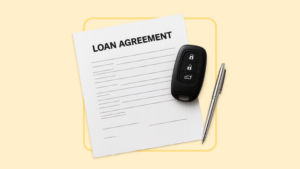What happens to a cosigner when a car is repossessed?

Key takeaways
- As a cosigner on an auto loan, your credit will suffer if the lender repossesses the vehicle.
- You may still be responsible for paying on the loan, even after repossession.
- To avoid repossession, work with the lender to devise a payment plan or be removed from the loan.
If you’re a cosigner on an auto loan, car repossession is a legitimate fear. You can face serious consequences if the primary borrower misses loan payments and the car gets repossessed. Be sure to understand all the implications of “cosigning gone wrong” before taking on the responsibility.
How a cosigner is affected by repossession
When you cosign on an auto loan, you take full responsibility for the debt, regardless of who is in possession of the vehicle or acting as its primary driver. Accordingly, repossession’s impact on your credit is the same as it would be for the primary driver of the vehicle.
“Repossession is bad for both the borrower and the cosigner because both credit scores will take a hit. Late payments, loan defaults, loans sent to collections and court judgments can show up on the primary borrower reports and the cosigner’s reports,” says Howard Dvorkin, CPA and Chairman at Debt.com.
Lenders aren’t obligated to notify a cosigner if the primary borrower stops making payments. In many states, they aren’t even required to send a notification if they decide to repossess the vehicle. As a protective measure, cosigners should protect themselves by tracking payments and proactively contacting the primary borrower or lender if a payment is late or missed.
As the cosigner on an auto loan, you will suffer the same impact on your credit as the primary borrower until the debt is paid in full. Your credit score, your available cash and the relationship you have with your delinquent cosigner are at risk. If things go poorly, all three could suffer.
Your credit will take a major hit
When you cosign on an auto loan, you take on all the credit impacts of the loan, which can be good if the primary borrower manages the loan well. But if they don’t pay on time, miss payments or default, it will negatively impact your credit. A repossession can decrease your credit score by a hundred points or more.
“A repossession goes on your credit report — and it stays there for seven years. That will drag down your credit score long after the car is gone,” says Dvorkin.
If you do face a negative impact on your credit score, all is not lost. You can work to repair your credit. Establishing a budget, maintaining positive financial habits and talking to a credit counselor when necessary can all help you increase your credit score.
You may still owe money on the repossessed car
As a cosigner, you are legally responsible for the loan. You are responsible for paying back any money owed on the loan if the primary borrower doesn’t.
Once the lender repossesses the vehicle, they can sell or auction it to recoup any loaned funds. However, in some cases, you may owe more on the car than it’s worth, which means you may still owe money on the loan even after repossession.
As the cosigner, make sure your responsibilities are taken care of. Do your due diligence after repossession to determine how much you owe on the loan, and work with the lender and the primary borrower to figure out how to pay off the loan.
How to protect yourself from repossession as a cosigner
If you think a vehicle you’ve cosigned for may be at risk of repossession, you can work to protect yourself before it happens. You may be able to avoid certain repercussions or get out of the car loan altogether if you plan ahead.
- Stay in contact with the lender and make payments when necessary. If you can afford this, keeping current on payments is the simplest way to prevent repossession.
- Ask for a deferral. If you can’t afford to make payments, document the financial distress in a formal hardship letter and ask if skipping a payment or payments is possible. Skipped payments will be added to the end of the loan term.
- Pay off the loan in full. If you can afford to pay off the loan, it’s an option. Then, you won’t have to worry about what the primary borrower may or may not pay on the loan.
- Settle the car loan. You and the primary borrower may negotiate with the lender to settle the debt by paying a lump sum less than the amount owed. You’ll need to pay taxes on the forgiven debt and will still see a negative effect on your credit score, but it can help you avoid multiple derogatory marks from many missed payments.
- Negotiate a payment plan. Dvorkin says that if you negotiate a payment plan with the lender and successfully make payments, the lender “might hand you ownership of the vehicle.” He adds, “Once you’ve paid it off, you can try to sell the car and get back some of the money you’ve lost. At least this way, you preserve your credit score.”
- Get removed from the loan. If you find you don’t want to be on the loan any longer and the primary borrower hasn’t missed payments, they may be able to refinance the auto loan without you as a cosigner. The primary borrower may want to take this course of action if they would get a higher refinance rate.
Bottom line
Cosigning for a loan is risky, and it puts your credit and money on the line. Before you cosign for an auto loan or any other kind of loan, consider what you will do if the primary borrower defaults.
Rather than cosigning, you might consider helping your friend or family member figure out what car they can afford and looking for options that don’t require a cosigner. It may also be helpful to check bad credit auto loan rates.
Why we ask for feedback Your feedback helps us improve our content and services. It takes less than a minute to complete.
Your responses are anonymous and will only be used for improving our website.







